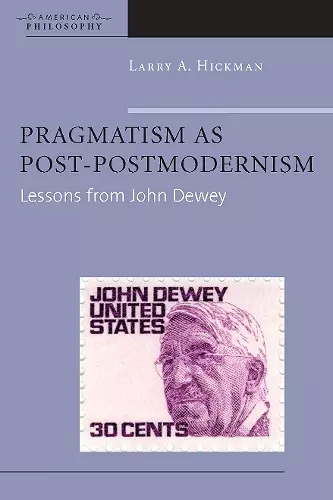Pragmatism as Post-Postmodernism
Lessons from John Dewey
Format:Hardback
Publisher:Fordham University Press
Published:15th Dec '07
Currently unavailable, and unfortunately no date known when it will be back
This hardback is available in another edition too:
- Paperback£35.00(9780823228423)

Larry A. Hickman presents John Dewey as very much at home in the busy mix of contemporary philosophy—as a thinker whose work now, more than fifty years after his death, still furnishes fresh insights into cutting-edge philosophical debates. Hickman argues that it is precisely the rich, pluralistic mix of contemporary philosophical discourse, with its competing research programs in French-inspired postmodernism, phenomenology, Critical Theory, Heidegger studies, analytic philosophy, and neopragmatism—all busily engaging, challenging, and informing one another—that invites renewed examination of Dewey’s central ideas.
Hickman offers a Dewey who both anticipated some of the central insights of French-inspired postmodernism and, if he were alive today, would certainly be one of its most committed critics, a Dewey who foresaw some of the most trenchant problems associated with fostering global citizenship, and a Dewey whose core ideas are often at odds with those of some of his most ardent neopragmatist interpreters.
In the trio of essays that launch this book, Dewey is an observer and critic of some of the central features of French-inspired postmodernism and its American cousin, neopragmatism. In the next four, Dewey enters into dialogue with contemporary critics of technology, including Jürgen Habermas, Andrew Feenberg, and Albert Borgmann. The next two essays establish Dewey as an environmental philosopher of the first rank—a worthy conversation partner for Holmes Ralston, III, Baird Callicott, Bryan G. Norton, and Aldo Leopold. The concluding essays provide novel interpretations of Dewey’s views of religious belief, the psychology of habit, philosophical anthropology, and what he termed “the epistemology industry.”
Pragmatism as Post-Postmodernism: Lessons from John Dewey is available from the publisher on an open-access basis.
"Larry A. Hickman is one of the best interpreters of the American pragmatic tradition, especially the thought of John Dewey. In this collection of essays, he presents a vigorous, lively, and lucid defense of the relevance and importance of pragmatism for dealing with some of the most pressing and complex issues of our time-including technology, the environment, and globalization. He persuasively argues that classical pragmatism is "waiting at the end of the road" traveled by modernist and postmodernist thinkers." -- -Richard J. Bernstein New School for Social Research "Larry Hickman has here reinvented John Dewey and pragmatism, this time in the postmodern context. No one does better than Hickman in translating the implications of pragmatism into its contemporary relevance. And here the romps through technology and the Critical Theorists, issues of the environment and the chapters on Dewey himself are lively and revealing." -- -Don Ihde Stony Brook University "... A critical discussion about the complex relation between philosophical postmodernism and classical pragmatism." -Educational Theory "A much needed contribution to the philosophical literature on pragmatism." -- -Michael Eldridge University of North Carolina "Ties a rigorous discussion of complicated philosophical disputes to their usefulness and worth in real-world issues such as global citizenship, religious disputes, and cultural conflict." -- -Charlotte Haddock Seigfried Purdue University "While Pragmatism as Post-Postmodernism indeed connects the philosophical schools of thought referenced in its title, potential readers should be advised that Hickman also provides one of the best analyses of recent work on technology and environmental philosophy currently available. No where else is the work of contemporary figures such as Rolston, Callicott, Norton, Feenberg and Borgmann so well addressed, and to have a critical study that engages all of these figures between two covers represents an intellectual windfall of the first order." -- -Paul B. Thompson Michigan State University "In these wide-ranging essays, Larry Hickman demonstrates once again his deep knowledge of Dewey's philosophy. He brings Dewey's voice into the very midst of many of today's most urgent debates about how to interpret and respond to our human condition." -- -David T. Hansen Columbia University
ISBN: 9780823228416
Dimensions: unknown
Weight: unknown
296 pages